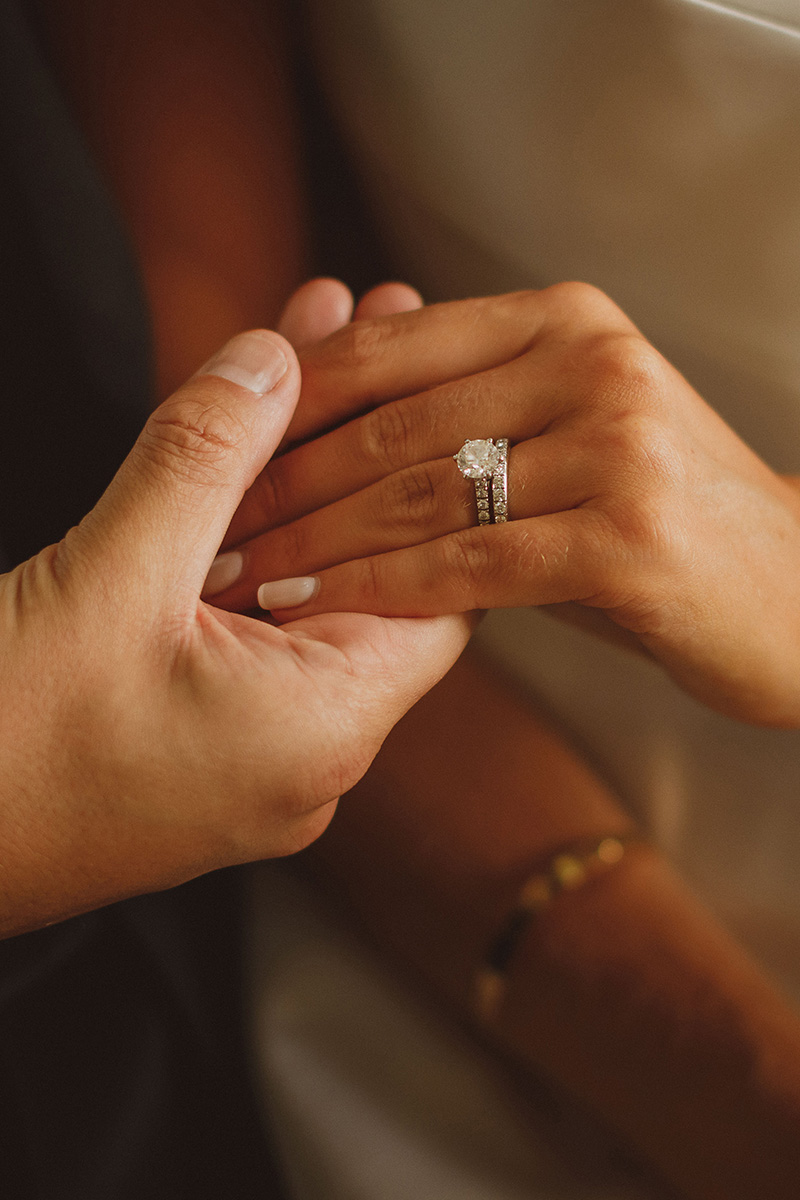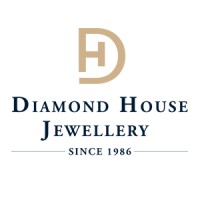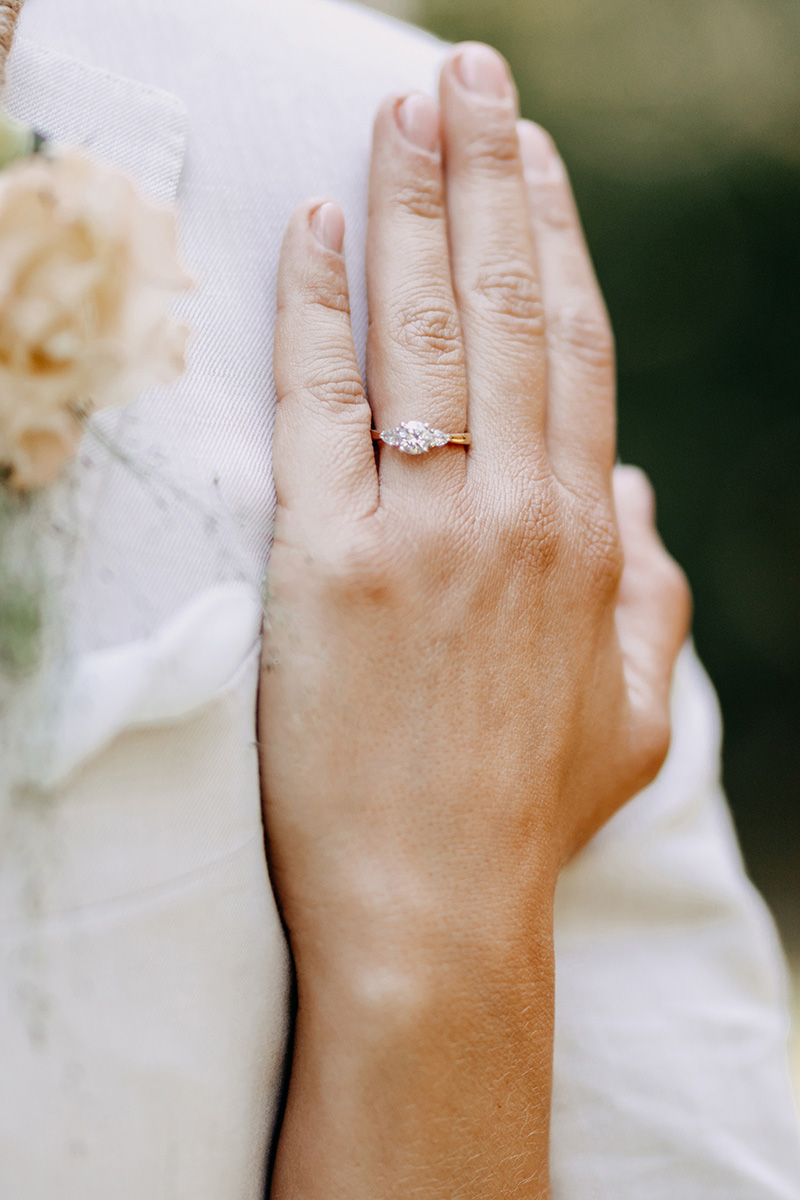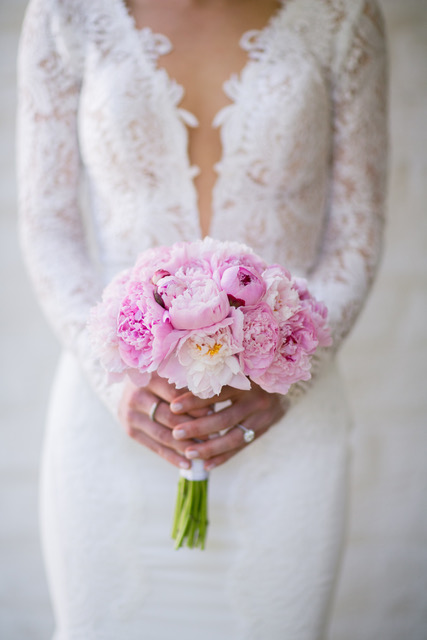Céline Gouwy: One of our priorities is to bring the diamond industry and prices from Antwerp to London. Our prices are much more favorable than those you will find at high-end stores in London. And the diamonds are the same. The certificates are the same. They both come from the same suppliers. We have the same suppliers as those big brands.
Rob van Beurden: We for example only work with master goldsmiths. I even think that we often outclass those big brands.
Who are your customers?
Rob van Beurden: There is a top three of customers. They come either for an engagement ring, a wedding ring, or a so-called push present. That's a gift for when a woman brings a child into this world. And then there is also the 'late engagement' ring. It is bought by men who did not have the funds to buy anything decent at the time of the engagement. Later, for example at an anniversary, they will buy something nicer, with a larger stone.
Céline Gouwy: We offer ready-made and tailor-made jewellery, according to the customer's specifications. And we go so far that I sometimes fly to Italy because we know that sometimes the Italian manufacturers are more suitable for that specific kind of necklace. We know who is where for every type of jewellery.
Thorough advice.
Rob van Beurden: What we really and very clearly distinguish ourselves in is the personal and specialized advice. We once made some anonymous visits to brand stores to experience what it's like out there when you're looking for an engagement ring. A salesperson asked what we're looking for and one of us says, “Gee, I don't know. A yellow diamond?” To which the salesman replies: “Ha, the lady has taste.” And then he shows some yellow diamonds that are much too expensive, after which Céline also asks about white diamonds. “Oh,” such a salesperson says. “Madam is a connoisseur.” They often tell you anything as if they were on commission.
Céline Gouwy: You notice that they are real salesmen, but usually certainly not experts.
Rob van Beurden: Even the big brands have people who just don't know what they're talking about. They are sellers and they sell. But if you peel off the onion, even one layer further, they won't know what to say anymore. We, on the other hand, are technical experts. As a result, we can sometimes say to a customer with a specific wish: don't do it! That makes us unique. If a customer comes up with a certain wish, we are able to advise against it and explain why. If we determine that something technically involves too much risk or that a customer is aiming for far too high quality, which we believe is a waste of money, then we are the first to say: leave it. We leave the pink cloud in which people come to buy a diamond for what it is. We look at it more technically. We talk about molecules, about atomic structure, about the difference between diamonds from f.e. Botswana and from Angola, because they differ in structure. With us you can peel the onion to the core and we can answer. And in the end it is of course still about the design and how beautiful the jewel looks. But we guide customers on the way there.
Céline Gouwy: In a sense, we are educating people. We train them, over and over again.
And that works?
Céline Gouwy: That certainly works. Because that is how you build trust. A diamond is pre-eminently a product where a customer must be able to trust you, because he himself does not know enough about the very subject. Some houses tell customers that they should buy a diamond that is flawless on the inside. Actually, that's nonsense. We explain why that is not necessary and that you should not necessarily spend so much money for a beautiful diamond. And we show alternatives. Then such a customer sees that there is actually no difference between those diamonds, only on paper, and he also asks himself: why should I pay so much more for something that I cannot see with my own eyes? This is how you build trust and that is trust that lasts.
Rob van Beurden: We once had a customer who wanted a large heart-shaped diamond. We pointed out to him that 85 percent of the diamonds sold are round. So they are much more volatile. If someone offers me a round brilliant diamond in the morning, I can sell it again in the afternoon if both parties agree on the price of course. But if someone comes to me with a heart-shaped diamond, which has very limited demand, I can maybe only give half of that amount because it can take me up to 2 years before I get it sold again. And until then, my investment will remain dead capital. Anyway, we never fail to inform our client about this possible scenario.
Céline Gouwy: We put all the disadvantages, the red flags, and all the pitfalls on the table.
Anyone can of course call themselves an expert. How can you substantiate that?
Céline Gouwy: We each have our own background and experience. I used to work as a gemmologist, someone who studies and grades gemstones. I worked in a lab and examined about 100 – 150 diamonds a day! My eyes are trained to see everything on that domain. When we receive an inquiry, we personally select the diamonds because we know what is good for our customers and what is not.
Rob van Beurden: Me I have been in this industry for 40 years. I am one of 1,500 people in the world who can judge a diamond not only by its quality, but also by its value. There are indeed only 1,500 of them walking around on this planet and I am quite proud of that.
Why do you find it fascinating to work with diamonds?
Céline Gouwy: We always deal with happy people. They come to us at moments of joy: an engagement, the birth of a child, a wedding anniversary, a marriage. You are always part of happy moments.
Rob van Beurden: A friend of ours is a lawyer. He has to deal with misery all day long. It's always about difficulties. Another friend of ours is an orthopedist. Sometimes he really has to puzzle people back together after say a motor accident. When they told me about their work, I started to realize how lucky we are. We are always faced with happy occasions. That is an added value in your life. And it's also sexier than selling insurance.
Diamonds are a girl's best friend?
Rob Van Beurden: Yes. They still are.
DO'S AND DON'TS
Rob van Beurden: There is something else in which we are proud to distinguish ourselves from other traders. With every jewel we sell, we provide the customer with a list of things that he is not allowed to do. And that is quite a long list. That way we try to avoid situations where someone comes back to show us that their round ring has turned oval. But then it might turn out that she works out every day with weights in the fitness center. If you don't tell people that beforehand, things like this can happen. Actually, you have to educate them a little bit about how to live with jewelry. Because precious metal is soft. For example, you are not allowed to go swimming with jewelry. Because while swimming, your finger shrinks a whole size and before you know it, you've lost your ring.
Céline Gouwy: On top of that, we offer lifelong free after-sales service. You don't find that much either. This may involve cleaning, minor repairs or adjustments. Of course, if we notice that the jewel has been treated badly, we will have to charge the costs. But it helps us to see how a lady handles her jewellery and then we can give feedback immediately. For example, we see it immediately when someone sleeps with it. Sheets are in fact large polishing cloths that can wear & tear jewellery up to 30% faster. This way you gradually have less and less metal. We then advise the customer not to do that anymore. And that is appreciated. It is also nice for them to know that if something goes wrong with their jewel, they can come back for a solution.
May I say that your main goal is not to sell even more volume, but that the focus is more on quality?
Rob van Beurden: And on knowledge!
Céline Gouwy: That's how we earn our 'repeat clients' and customers who talk about us. Meanwhile, 80% of our new customers are so-called 'referral clients' that were sent to us by our existing customers.
Rob van Beurden: The free maintenance of jewellery also plays to our advantage. The more a ring shines, the more often their friends ask where they purchased it. It works in two directions. For us it is a direct marketing at little cost.
ECOLOGICAL
A small part of Diamond House's business revolves around recycled diamonds. Old jewellery is sometimes transformed into a more contemporary design. Or we purchase an old piece of jewellery, recut the diamond(s) to a more modern cut and take it to the market again.
Since the turn of the century, another sub-activity has been added: lab grown diamonds.
Rob van Beurden: That is a different product, but one that will remain. Such a synthetic diamond is grown in a lab. But do not make any mistakes; it ís a real diamond, with the same specific gravity, the same hardness, the same molecular structure. But while a classic diamond is easily 300 million to 3 billion(!) years old, such a lab grown diamond was made yesterday. It has an ecological footprint that is 13 times smaller than a classic diamond. It's also about half the price.
Is that something you'll bet more on?
Céline Gouwy: If customers ask, then yes we will help them. But as an investment, we don't actually believe in it. We have seen the prices of those first generations of lab grown diamonds go down all the time. If you ever want to sell it, you won't get much for it.
Rob van Beurden: They are actually two different markets. If you buy a natural diamond for an amount of say 100, the market will give you back 50 afterwards (we give more, but say you offer it elsewhere). You can buy such a lab grown diamond for 50, but when putting it back up for sale, the market will only give you 10 in return. And in this case; We also! If of course, you find someone who is interested to buy it. So it is not a good investment. We also give our honest opinion and advice there. Lab grown diamond therefore has its advantages but also comes with its disadvantages. I notice that about 25 percent of men are open to buying synthetic diamonds. For them, the ecological footprint is the most important argument, but my feeling tells me that it is the lower price that matters to them 😊.
But if you ask ladies how they feel about lab grown diamonds, the response is: it must be the real thing.
After all, Nothing Beats the Real Thing.



